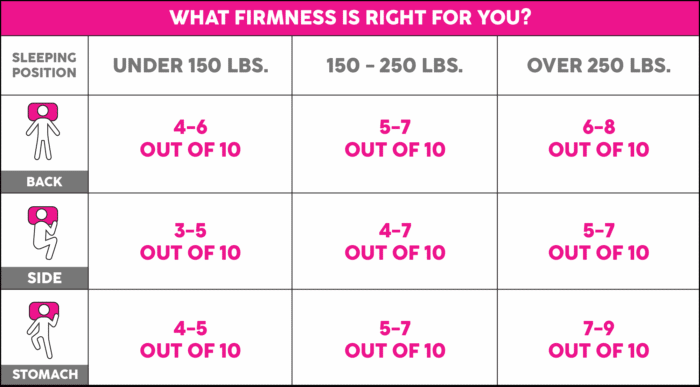If you ask a random group of people what position they like to sleep in, approximately 16% of those sleepers would say they are stomach sleepers.

Stomach sleepers may fall asleep on their stomach or simply move to their stomach in the middle of the night during sleep.
No matter how you get there, stomach sleeping can cause some uncomfortable issues to arise if you’re not careful.
This guide breaks down the risks of stomach sleeping and how to be a better stomach sleeper if you frequently find yourself face down. Let’s get started.
In This Guide
Stomach Sleeping Risks | Improve Stomach Sleeping | FAQ
#1. It puts strain on your back.
When you’re lying on your stomach, your spine has a hard time finding a neutral position.
Especially if you have a thick pillow under your head, the spine is likely to curve upward from the base of the back and elongate towards the head.

Eliminating the pillow is still not ideal because, at a minimum, it flattens the natural curve of your spine.
This posture all night can cause tension in your back and is also related to poor spinal alignment which, naturally, leads to back pain.
#2. It can aggravate your neck.
In addition to back pain, stomach sleeping can also irritate the muscles in your neck. When you’re lying on your stomach, your head naturally falls to the left or the right.

This forcible twist also causes a twist in the spinal column at the base of the neck which can enflame the muscles that surround the area.
#3. It can cause wrinkles or breakouts.
This one may surprise you, but stomach sleeping can actually cause wrinkles or breakouts. When you sleep on your stomach, your face is naturally pressed into your pillow more than if you were a back sleeper.
This direct contact between your face and the pillow can cause folds in the skin which ultimately contribute to deeper wrinkles as you age.

Breakouts can also occur for similar reasons. When you are buried in a pillow, the skin does not receive as good of airflow. Any oils or dirt in the face can be pushed deeper into the pores, sometimes clogging them and resulting in breakouts.
#4. It can be harmful during pregnancy.
This one may seem like a no-brainer, but sleeping on your stomach can actually be harmful (or at a minimum, uncomfortable) during pregnancy.

As a pregnant belly grows, any extra pressure can cause pain as it forces the baby to move closer to your spine. This extra pressure can cause back pain to flare up or an increase in sciatica pain as well.
Tips to Improve Stomach Sleeping
If you find yourself really enjoying stomach sleeping or even just having difficulty breaking the habit, that’s okay. Stomach sleepers are not inherently bad sleepers.
But there are a few tips you can try to limit the potential risks or discomforts of stomach sleeping.
1. Add pillows
The right kind of pillows in the right places can help to reduce the risk of pressure points, tension, or other pain while sleeping on your stomach.
- To avoid neck pain, opt for a thinner pillow under your head.
- To avoid back pain, add a pillow under your hips to help support your spine.

Pillows can also be used to encourage side sleeping if you want to stop stomach sleeping.
Simply add a long body pillow under your stomach, and lay slightly on your side. This gives the feeling of stomach sleeping, but while sharing the pressure loads with your hips.
2. Use a firmer mattress.
A firmer mattress can also help support stomach sleepers. While personal preferences can differ, stomach sleepers generally need the support of a medium-firm to a very firm mattress.

Your weight can also play a role. Lightweight stomach sleepers can sometimes get by with a softer mattress (4-5 out of 10 on the firmness scale), while moderate and heavier stomach sleepers typically need a firmer mattress to get the same level of support.

As you can see in the chart above, side sleepers or back sleepers have different firmness needs. Among all 3 categories, stomach sleepers generally require a firmer mattress in all weight classes.
3. Do morning stretches.
Taking the time to do some stretches in the morning is a great way to help offset the discomfort of stomach sleeping.

A morning stretching routine doesn’t have to be long or complicated to be effective. Two especially effective stretches for stomach sleepers include:
You can click the titles below for video guides on how exactly to do each stretch. For best results, do these stretches right after waking up to help your body recover quickly.
MORE: Full Morning Yoga Warm-Up (20 minutes)
You can also click the link about for a full 20-minute morning warm-up video of stretches after sleep.
FAQs
Sleeping on your back is said to be the healthiest position for sleep.
Yes. Stomach sleepers need a firmer mattress than side sleepers. The extra firmness helps to keep your spine in alignment and prevent painful sagging or pressure points.
It is easiest for a stomach sleeper to transition into becoming a side sleeper (opposed to back sleeping). To make the change, start by adding a long body pillow under your stomach, but while still keeping the majority of pressure on your hips. This gives the feeling of stomach sleeping without the harmful effects.
Sleeping on your stomach can increase back pain, neck pain, and even aesthetic changes like more wrinkles or breakouts. It can also danger or cause discomfort for pregnant women and their babies.
Research shows that stomach sleepers tend to have more anxiety, impulse, and rigidity. Sleeping with your hands up or under the pillow is also linked to a dislike of criticism.



